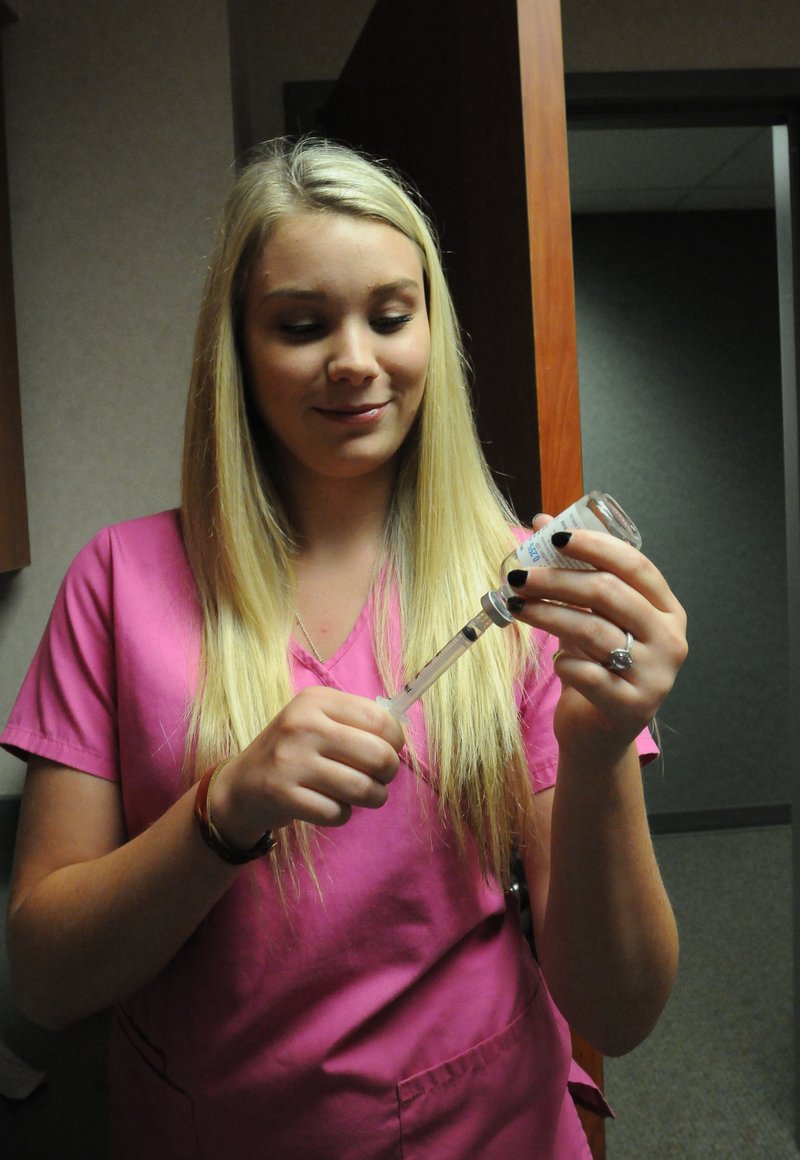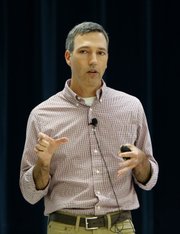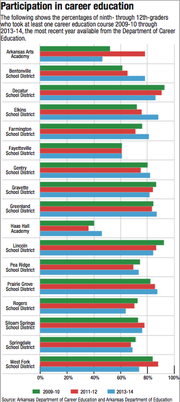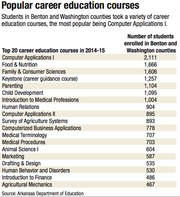Haley Hanson enrolled in Pea Ridge High School's Manufacturing and Business Academy last school year to study health care. Her mother, a certified nursing assistant, encouraged her.
Hanson, 17, earned her certified nursing assistant's license through the program. On June 1, she started working at the Agility Center, an orthopedic clinic in Bentonville. She helps put on casts, removes stitches and staples, and takes care of patients' basic needs, she said.
Hanson plans to continue working there part-time throughout the school year.
She gives a lot of credit to her instructor, Elisha Escajeda, who she said made learning fun and "opened my eyes to a lot of things." Escajeda has encouraged Hanson to continue her education so she can pursue a career in neonatal intensive care.
"I've always really liked babies," Hanson said.
Hanson also said she likes the academy program much more than regular high school.
"You have more freedom and they treat you more like adults than kids. It's pretty much preparing you for real life," she said.
By the numbers
"She said if I could start this young, I could be a (registered nurse) by the time I'm 23," said Hanson, who will be a senior when school begins Monday.
An estimated 65 percent of all jobs nationwide will require education beyond a high school diploma by the year 2020, up from 28 percent in 1973, according to a Georgetown University Public Policy Institute report published in 2013 titled Recovery: Projections of Jobs and Education Requirements Through 2020.
While 35 percent of those jobs will require at least a bachelor’s degree, 30 percent of those jobs will require some college or an associate degree, according to the report.
In Arkansas, about 59 percent of all jobs will require training beyond a high school education, Childers said. Employers want individuals with analytical skills, who can think on their own and have a good math and science background.
State Sen. Jane English, R-North Little Rock, a longtime proponent of career and technical education, cited the Pea Ridge academy program and one in Siloam Springs as examples of career education successes. The two are among about a half-dozen district-run charter schools operating or planned in Northwest Arkansas that have a career focus.
English's interest in career education started while she was working for the Arkansas Industrial Commission trying to recruit industry to the state.
"I found we didn't have employees with the skills (employers) were looking for," English said. "There is a national crisis with baby boomers retiring and not a group of folks to come along and take their place."
English is encouraged by what she's seen during the past two years and has noticed "a huge conversation" about what the state must do.
English sponsored the bill during this year's legislative session that became Act 892, which created the Career Education and Workforce Development Board. The 13-member board, which recently met for the first time, will administer the state's technical, vocational and occupational programs and formulate statewide initiatives for career education and workforce development.
"We'll hear what (employers') needs are and form some working groups to better understand their needs and see where we need to be spending some of those resources," she said.
Career education programs prepare students for jobs immediately after high school, and increasingly for them to attend technical schools, community colleges or universities, said Charisse Childers, director of the Arkansas Department of Career Education.
"We need to prepare and have opportunities for all students, so they can decide to do either or both," she said.
The programs can help students select a career and then determine what education is necessary to pursue it, said Marcia Sanders, assistant director for the Northwest Arkansas Education Service Cooperative.
Educators and policymakers have pushed college for everyone, but research shows a four-year degree is not as essential to finding a well-paying job as once thought, Sanders said. Educators should continue to try to increase college graduation rates and also understand that a bachelor's degree is not for every student, she said.
"Too many kids don't understand all of the different jobs available to them," Sanders said. "We have a large number of jobs going unfilled. We're hoping to better educate our students for the careers out there."
EMPLOYERS DRIVING CHANGE
The academy at Pea Ridge is a two-year high school program that gives juniors and seniors real-world exposure to certain career paths. It started with 87 students last year and will have 141 students this fall, Charley Clark, academy director, said.
What the academy teaches is largely dictated by what Northwest Arkansas employers partnering with the district say they need in their particular industry.
In the health care pathway, for example, the academy originally set out to train students in one specialty in the health field, but switched gears when industry partners told the district they had a greater need for certified nursing assistants.
"We find out what they want the kids to know, and then implement it," Clark said.
The Manufacturing and Business Academy has drawn significant interest. Representatives of more than 20 school districts, mostly from Arkansas and Missouri, have visited the program, Clark said. Gov. Asa Hutchinson toured it during his campaign last fall.
Siloam Springs High School is trying something similar with help from corporate partners.
Simmons Foods was one of the first companies to approach the district about beefing up its vocational programs. The company has about 300 positions open in the region, of which about 10 to 15 percent require some technical skills, Todd Simmons, chief executive officer, said.
A 10,000-square-foot building set to open next month will house a Career Academy devoted to teaching students about industrial technologies. Educators worked with manufacturers to design a two-year program to help fill industrial maintenance positions in manufacturing plants, said Jody Wiggins, assistant superintendent.
Forty-three students will begin the program this fall, and Wiggins believes they'll eventually have 120 juniors and seniors involved.
Northwest Arkansas companies and individuals have pledged or donated more than $1 million of the $1.4 million cost of the academy's facility; another $1.5 million has been donated or pledged for $2 million worth of equipment inside the building, Wiggins said.
Manufacturers and other employers in Northwest Arkansas within the past few years have told Perry Webb of their struggle to find workers with the skills they need to fill vacancies. What were once repetitive, vocational jobs are now high-tech jobs, said the president and chief executive officer of the Springdale Chamber of Commerce.
Webb said an in-depth study of the region's workforce found a breakdown in communication among educators and employers, he said.
Since then, the chamber has worked to make sure employers, school districts, Northwest Technical Institute in Springdale, Northwest Arkansas Community College in Bentonville and the University of Arkansas are talking regularly, Webb said.
IGNITING PASSIONS
At one time, particularly in the 1970s, vocational education primarily focused on farming and trade skills for students who weren't going to college, said Kate Blosveren, associate executive director of the National Association of State Directors of Career Technical Education Consortium.
Today's students are expected to experience multiple career changes and need to understand the full range of options in a career field, Blosveren said.
Students explore careers in middle school and high school, Blosveren said. Hopefully, they'll figure out what they do and don't like before entering college and accumulating student loan debt for jobs they don't want, she said.
A new program in the Bentonville School District emphasizes close partnerships with businesses and will allow students to gain experience through internships and through providing professional services to businesses and nonprofit clients in the community. The program, Ignite, is based on the Center for Advanced Professional Studies program that originated in the Kansas City, Mo., area.
"There's a lot more choices for students to develop their own learning model," said Andy Mayes, the district's director of technology and the class instructor. "It's very individualized, targeted toward aligning needs of the community with students interested in working in those fields."
Ignite starts this fall with a course on information technology solutions, with plans to add classes in other career fields in subsequent school years.
The information technology solutions class will meet for more than two hours each day for five days per week at the Bentonville office of Tata Consultancy Services, Mayes said.
"So we'll have some real good time to spend on projects," Mayes said.
Castle Kerr, a senior, is one of 17 students signed up for Mayes' class. He said he's always liked computers, and the information technology class fit his interests.
"I'll get to work with other people who are really interested in it, too," Kerr said.
Mayes hopes Ignite will help students discover their passion early. He recalls becoming interested in computer programming when he he was young, but didn't have the kinds of opportunities the Ignite program offers. It wasn't until he joined the military that he rediscovered his passion.
BLENDING OF TRACKS
Skills necessary for jobs in industry are the same skills students need to succeed in college, said Sarah McKenzie, director of education policy at the University of Arkansas.
"I don't see them as being two separate tracks anymore," she said. "People are thinking of that as part of a well-rounded high school. There needs to be opportunities for kids to develop career skills."
Joe Rollins, career and technical education coordinator for Springdale School District, agrees. Conversations about career education no longer focus on separate tracks for students, either career preparation or college preparation.
"One of the best conversations now is how they blend together," Rollins said."We want our students to have both experiences, a career and technical understanding, real-world experiences, and if they choose, to carry that into a four-year degree and beyond."
Business and industry leaders have told Springdale educators about the talents, traits and skills they want in employees, Rollins said. The conversations helped inform curriculum for career academies at Springdale and Har-Ber high schools.
Ryan Brown, 19, remembers attending a career day in ninth grade and learning about the district's Law and Public Safety Academy at Springdale High School. He knew he wanted to follow his father in becoming a police officer.
He studied police work in the academy for three years before graduating in May.
"We'd learn how to handcuff, proper etiquette, how to develop a crime scene, dispatch procedures, pistol grip procedures with Airsoft guns," Brown said. "You were surprised about all the things you were able to do as a kid in high school."
His landed a job as a jailer this summer, he said. He's making $12.50 an hour, a bump from the minimum wage he was paid at a car dealership. He's saving for an apartment and plans to apply to the police academy.
"It's the one job I've always wanted, working at a police station," Brown said.
Springdale also has about 400 eighth- and ninth- graders enrolled at the School of Innovation, which will add one grade a year for the next three.
Aspirations of the school include helping students find a career focus, giving them experience in internships and enabling them to earn an associate's degree from Northwest Arkansas Community College while they earn a high school diploma, Rollins said.
The hope is to ease the transition from high school into post-secondary education programs or college.
"This is our responsibility to really try to work with our community to get students prepared for work in our region," Rollins said.
JOBS FOCUS
In rural districts, career education programs often still focus on reaching students who aren't likely to pursue a college degree.
In Gravette, the high school principal and superintendent noted more than 40 percent of high school graduates weren't pursuing any post-secondary education.A certified nursing assistant program started two years ago and a three-semester program in heating and cooling systems began last school year.
"This summer, eight of our kids were offered summer jobs with (heating and cooling) companies, and they haven't even completed the program," said Jay Chalk, high school principal.
Kelly Horn teaches in the program and and owns Bulldog Heating and Cooling in Rogers. The pay he receives for teaching isn't great, but he has a great chance to get to know potential employees, he said.
There is an extreme shortage of qualified technicians in the area, Horn said.
"You've got companies that have 50 trucks or more and they have 10 trucks sitting idle because they don't have the workers," he said.
Educators don't want to limit students to formal post-secondary education programs, said Larry Ben, superintendent for the Greenland School District.
A new partnership is an example of what Greenland School District hopes to do as it develops a career academy to make high school more relevant for students, said John Diesel, who teaches the Environmental and Spatial Technology program.
Marshalltown Tools in Fayetteville has hired two Greenland students to work in its information technology department. One of them is now studying at the university.
The school district is proposing a conversion charter for the high school to offer a career academy so students can have flexible schedules to pursue internships and apprenticeships.
Some educators are irked by the career education trend. Andre Perry is a consultant for programs that promote college readiness, retention and completion.
"This comes out of the culture of low expectations," he said. "Exposing students to careers is fine. Not preparing students for college isn't."
Career and technical skills should give students a context for careers they can pursue with a college education, he said. Plumbers should learn the foundations of physics, chemistry and math, he said.
Brenda Bernet can be reached by email at bbernet@nwadg. com or on Twitter @NWABrenda. Dave Perozek can be reached at dperozek@nwadg.com or on Twitter @NWADaveP.
NW News on 08/16/2015







